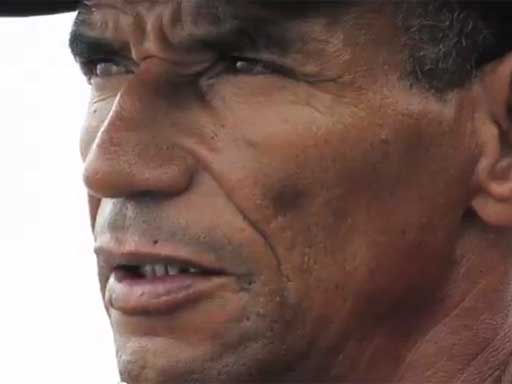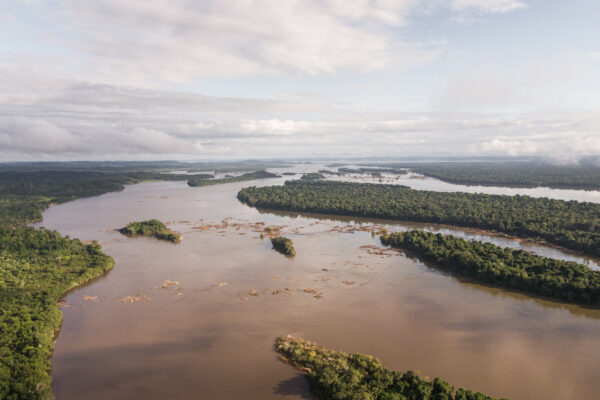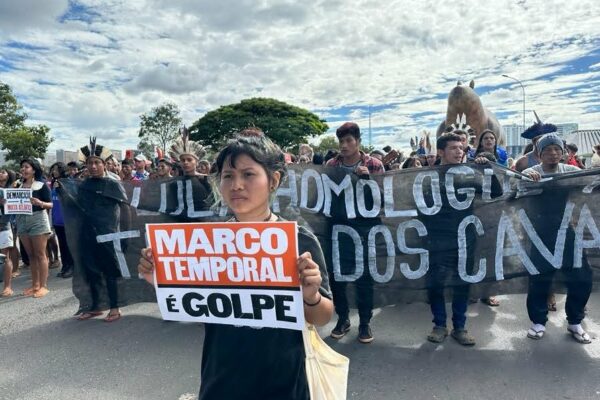Justice Now!
Join the worldwide chorus calling for justice by urging Brazil’s Supreme Court to rule on lawsuits against the Belo Monte Dam!
Standing amidst the rubble on his land and holding two mangos from a tree in his old backyard, Élio cannot contain the uncontrollable tears of sorrow.
“Here in this hand is the fruit of history. It feels so meaningless to see a monster like this coming and destroying everything so rapidly when I remember how hard I struggled to build my home and community.”
Élio Alves da Silva is a fisherman with a sorrowful story spawned by Brazil’s skewed development policies and the building of the Belo Monte dam. Though he feels like he has no right to speak out, Élio spoke to me. This is his story:
The community of Santo Antônio, where Élio lived for 32 years, was at km 50 of Altamira, Pará. There Élio built a life in community and in family. Every day, in the morning he fished. At times he would catch up to 132 lbs of fish in one day. While his house was only a 15 minute walk to the bank of the river, it would take him two hours to get there since he’d stop at the homes of neighbors for a chat and a sip of coffee; Things that only those living in community can understand.
“When Norte Energia arrived it changed our entire history. They came and did whatever they wanted. They expropriated [the property of] the 60 families and put an end to our community. They put an end to our dream. All that we had spent 32 years building was destroyed in just one year.”
I visited the community of Santo Antônio when it was still intact. There, with everyone, we held meetings and discussed their rights. The population appeared to share the conviction that they did not want to leave their lands. One year later, I witnessed the removal and destruction of many families and homes. It was very depressing to see. Even the cemetery was taken by Norte Energia, with its red mark on the tops of the crosses. How can it be that not even the dead are able to rest in peace? Throughout this same period Élio still remained there, resisting. We went to the edge of the river, which was already muddied and Élio confessed sadly that he could no longer catch even 11 lbs of fish. The fish were dying and on the table of the fisherman, the food shortage began. All the same, Élio and five other families, including his daughter, continued to resist.
Then, on June 13 2012, more than 300 people celebrated the day of Saint Anthony, patron saint of lost causes and the fait accompli, for the last time. The community had celebrated this day for the last 40 years, but now it was more than a tradition or symbolic act. It was an act of resistance to Belo Monte’s gross and abusive form of “development”.
The celebration began with a procession that carried the religious mast from the river to the entrance of the village. According to Élio, “There were four days of discussions, debates and tears. For those affected by Belo Monte, the meeting offered the vital breath of being heard. For the participants from other regions, these were hard moments of being confronted with the reality of the impacts from the dam. There, we celebrated the simplicity of life and we felt happiness for the last time in our community. It was a historic act of resistance. Something that Norte Energia nor the government could ever take away.”
Shortly after the historic event, six families were rapidly removed from the community. Élio eventually managed to buy a house far from the city, but also far from his daughter and the river. Thus, this fisherman who had known such abundant catches began a new and sad stage in his life, trying not to be “caught” by the loneliness.
“With the indemnification that I got, I could only buy a house far from the river, and I have felt very lonely. Early in the morning I get up and there is no one to say ‘good morning’ to. At lunchtime I sit alone at the table and have no desire to eat. I even put the TV in the bedroom, so I don’t have to walk around the house. There is a dent in the bed from my tossing and turning so much. I am afraid of depression. I am lost. I never imagined I would be in this situation.” Though very sad, he ended his testimony with a smile saying, “I am in that phase of telling it to the donkey and even he cries.”
In spite of the jokes Élio’s sadness is transparent and goes far beyond what he experiences within his own skin. Élio feels the pain of destruction of the river and his community.
“This wound no longer heals because it is a very deep wound. There is no healing being done for nature, or for our minds. Whoever thinks that Belo Monte is a good project, it is because they do not know this place and have not suffered even one third of what I suffered and still suffer. For us it brings nothing good.”
In early 2013, after being unable to face the loneliness, Élio left his new house and headed to the city of Altamira to live and work as a mason. We met and decided to go “fishing” on the river to talk about life and remember better days. We went to the site of the former community of Santo Antônio. There, amidst the rubble, the memories came back in an avalanche of emotions. Remembering the glory days and the days of struggle, we smile for an instant. But the silence and pain were inevitable.
“I have not seen anyone who lived in this community who has left and still has a true smile on their face. The dreams people had were destroyed. All that we worked for is gone. We built our community with our own hands. It was done with mutual support projects, we had no help from anyone. I have no desire to come back here to see all of this destroyed. It’s very sad, it makes me want to cry,” said Élio. Then Élio did cry, and I cried with him.
We decided to go ahead with our planned day of fishing. While we navigated the Xingu River under heavy rain, Élio whispered, “This river was a father to me. It was everything to me. It was my sustenance and my joy. I never abused this river. I always harvested its fruits with the greatest respect.” His love and respect for the Xingu River as a fisherman was inspirational and unexplainable.
Despite the apparent weariness in his face, the tears and the pain, standing before me was a warrior fisherman, this was clear.
“I am a fighter and never will I lower my head to this situation. While there is a person at my side willing to fight, I will continue to fight, no matter what happens. I have no fear of being arrested. I have no fear of dying. But if I am arrested or die tomorrow, at least it will be with the certainty that I died fighting for something that is my right, the right of my family and all who live here.”
Before parting I ask that he leave a record of his message to the world. With no illusions Élio humbly said, “My message to the world is that someone has to do something on our behalf. That someone needs to make this Brazilian government hear, so it remembers that there are people here. Citizens exist here who need and love this river.”
Read the first story from “Voices of the Xingu” here














